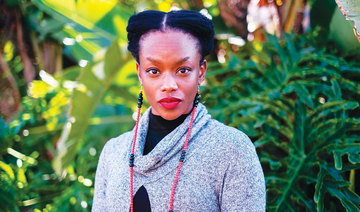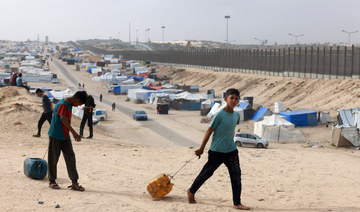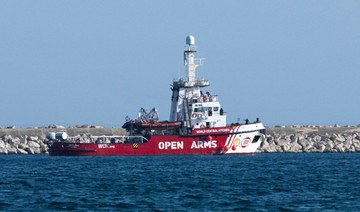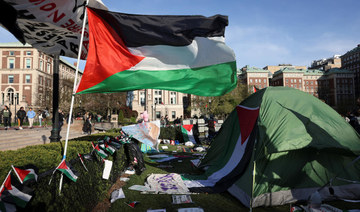HARARE, Zimbabwe: Each time Yvonne Gumbo, who has albinism, and her friends get together for a picture, she insists on being in the center.
“I tell them I make the picture beautiful because I am special,” she told The Associated Press at her home in Zimbabwe’s capital, Harare, recently.
“I have two different colors while they have one. I am black. I am white,” she said, smiling. “Who else can make the picture more beautiful?”
It’s the 22-year old’s way of fighting back against the deeply rooted myths and prejudices faced by people with albinism in Zimbabwe, where they are often ostracized, laughed at and pejoratively referred to as “white people” among other names.
While much of the world is engrossed in the race-related outrage over the death of George Floyd in the United States, Zimbabwe’s young people with albinism are fighting prejudices against the color of their skin.
In nearby Malawi and Tanzania, many people with albinism are killed because their body parts are thought to bring good luck. No such killings have been reported in Zimbabwe, which has about 70,000 people with albinism out of a population of about 15 million.
But prejudices remain deep-rooted.
Some people stare, whistle or verbally abuse those with albinism when they walk along the streets. Some believe sleeping with them can cure HIV. Many others treat albinism as a curse.
But for Gumbo, none of that bothers her anymore. These days she carries an aura of confidence she admits was absent during the first two decades of her life.
“I only started living my life two years ago. The stigma had gotten to me that most times. I felt I wasn’t as human as the others. I am now making up for those lost years,” Gumbo said. She said she only started making friends after she finished school, where she had been treated as an outcast by fellow students and even teachers.
“I was very quiet and afraid. Now my former classmates are shocked at how talkative and assertive I have become,” she said, attributing her newfound confidence to her membership in support groups.
Such programs include an annual Miss Albinism and Mr.Albinism pageant, although it has been put on hold this year due to coronavirus restrictions.
“We have to focus on success, not pity,” said Brenda Mudzimu, founder of the Miss Albinism Trust, which runs the pageant. The trust also offers career guidance workshops and support sessions for people with albinism.
“Right now we have albinos who are doctors, nurses … success stories on the frontline of the fight against coronavirus. We also have to talk about them to inspire others,” Mudzimu said.
However, the economic downturn caused by the restrictions to combat the spread of COVID-19 means that many people with albinism are struggling to put food on the table, let alone afford essential items such as sunscreen, skin lotions and other medications.
The Zimbabwe Albino Association, a representative group, has been lobbying parliament to enact a law making it mandatory for government to provide free skin lotions to people with albinism.
Joyce Mutenje used to provide for her three children, who all have albinism, by washing laundry and household cleaning for traders at a busy border town before the lockdown. But now the border trade has stopped and Mutenje has run out of money to get skin cream for her children.
“This is all that’s left,” said Mutenje, holding two small tubes of lotion. She hopes to make it last for two weeks by telling the children to put the lotion only on their faces.
Obey Machona, a 21-year-old media studies student at the University of Zimbabwe, said he is an advocate of “taking back control of our lives as albinos.” He said he used to support himself and his unemployed mother with part-time photography jobs. Now those gigs have dried up due to the lockdown and items such as skin lotion have become a luxury.
“What good is skin lotion when the stomach is empty?” he asked.
In Zimbabwe, people with albinism struggle against prejudice
https://arab.news/wqdth
In Zimbabwe, people with albinism struggle against prejudice

- In nearby Malawi and Tanzania, many people with albinism are killed because their body parts are thought to bring good luck
- Some people stare, whistle or verbally abuse those with albinism when they walk along the streets
Pro-Palestinian protests keep roiling US college campuses
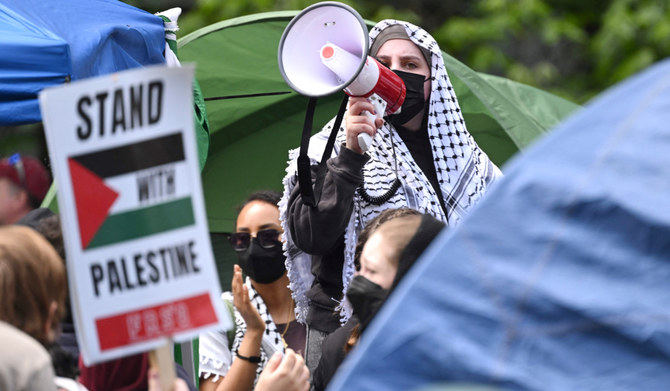
- Israel has killed more than 34,000 Palestinians, according to Gaza’s Health Ministry
- “They were expecting about 65,000 people on campus, and they just did not feel that it was going to be safe,” Bass said on CNN’s “State of the Union”
WASHINGTON: Pro-Palestinian protests at US universities showed no sign of slowing as they spread coast-to-coast over the weekend and police crackdowns and arrests continued into another week while students vowed to stay in tent encampments until their demands are met.
The students’ demands range from a ceasefire in Israel’s war with Hamas to calls for universities to stop investing in Israeli enterprises involved with the country’s military to an end for US military assistance for Israel.
Pro-Palestinian protests have spread to college campuses across the US, stoked by the mass arrest of over 100 people on Columbia University’s campus more than a week ago.
The Columbia campus was peaceful on Saturday and there were no reports of arrests of disturbances overnight, a school spokesman told Reuters.
But crackdowns continued at a handful of campuses on Saturday including a lockdown at the University of Southern California (USC) and a heavy police presence. More than 200 people were arrested at a handful of schools including 80 late on Saturday at Washington University in St. Louis. Among those arrested at Washington University was 2024 Green Party presidential candidate Jill Stein.
“They are sending in the riot police and basically creating a riot in an otherwise peaceful demonstration. So this is just shameful,” Stein said in a statement.
Washington University said in a statement that those arrested would be charged with trespassing.
On Sunday, dueling demonstrations were set to begin at the University of Southern California, Los Angeles. Outside groups were planning to demonstrate in favor of and against the pro-Palestinian encampments.
Members of the Harriet Tubman Center for Social Justice planned to support students’ right to protest.
In opposition, however, a group called Stand With Us will hold a “Stand in Support of Jewish Students” rally to “stand up against hatred and antisemitism.”
The nationwide protests have caught the attention of President Joe Biden.
White House national security spokesman John Kirby told ABC News on Sunday that the president knows there are very strong feelings about the war in Gaza.
“He understands that, he respects that and as he has said many times, we certainly respect the right of peaceful protest,” Kirby said. “People should have the ability to air their views and to share their perspectives publicly, but it has to be peaceful.”
Kirby added that the president condemns antisemitism and condemns hate speech.
At USC, leadership has canceled the main commencement ceremony after it called off the valedictorian speech by a Muslim student who said she was silenced by anti-Palestinian hatred.
Los Angeles Mayor Karen Bass said on Sunday she believed that canceling the commencement was a decision “they had to make.”
“They were expecting about 65,000 people on campus, and they just did not feel that it was going to be safe,” Bass said on CNN’s “State of the Union.”
China confronts Japanese politicians in disputed East China Sea area
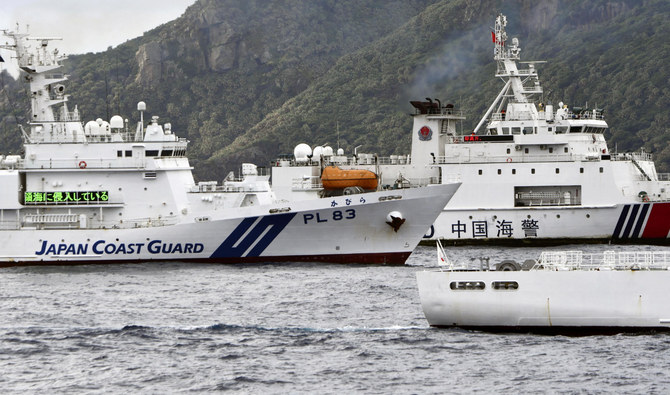
BEIJING/TOKYO: China’s coast guard confronted Japanese lawmakers in waters claimed by both countries in the East China Sea, China’s embassy in Tokyo and Japanese media said on Sunday, the latest in a series of maritime disputes involving China and its neighbors.
Chinese vessels took unspecified law enforcement measures, the embassy said in a statement, adding that it had lodged solemn representations for what it called “infringement and provocation” by Japan near tiny, uninhabited islands that Beijing calls the Diaoyu and Tokyo calls the Senkaku.
The Japanese group, including former Defense Minister Tomomi Inada, was on an inspection mission organized by the city of Ishigaki in Okinawa prefecture, according to the Chinese Embassy and Japanese public broadcaster NHK.
Japan and China have repeatedly faced off around the Japan-administered islands. China also has escalating run-ins with the Philippine navy in disputed areas of the South China Sea, where Beijing’s expansive maritime claims conflict with those of a number of Southeast Asia nations.
Inada’s group spent three hours near the islands on Saturday, using drones to observe the area, and the Japanese coast guard vessel sought to fend off the Chinese coast guard, NHK said.
“The government and the public are aware of the severe security situation,” said Inada, a senior official of the ruling Liberal Democratic Party, according to NHK. “The Senkaku are our sovereign territory and we need to go ashore for research.”
It was the first such inspection trip to the area involving a member of Japan’s parliament since 2013, NHK reported.
Officials of Japan’s foreign ministry were not immediately available for comment outside of working hours.
China strongly urged Japan to abide by what it called a consensus reached between the two countries, stop political provocations, on-site incidents and hyping up public opinion, the embassy said.
It asked Japan to “return to the right track of properly managing contradictions and differences through dialogue and consultation, so as to avoid further escalation of the situation.”
World Central Kitchen to resume Gaza aid after staff deaths in Israeli strike
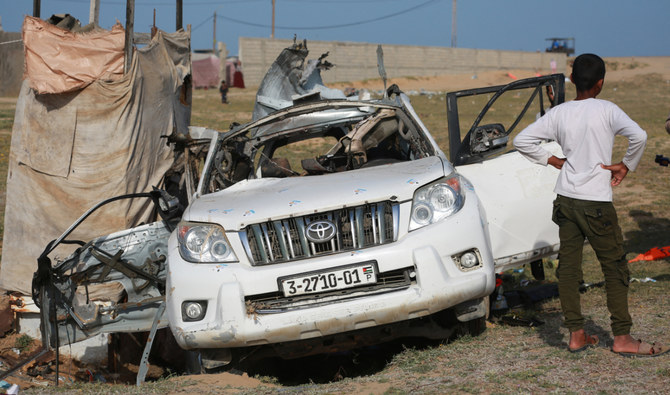
NICOSIA: World Central Kitchen or WCK said it would resume operations in the Gaza Strip on Monday, a month after seven workers of the US-based charity were killed in an Israeli air strike. Prior to halting operations, WCK had distributed more than 43 million meals in Gaza since October, representing by its own accounts 62 percent of all international NGO aid.
The charity said it had 276 trucks with the equivalent of almost 8 million meals ready to enter through the Rafah Crossing and will also send trucks into Gaza from Jordan.
“The humanitarian situation in Gaza remains dire,” said the charity’s chief executive officer Erin Gore.
“We are restarting our operation with the same energy, dignity, and focus on feeding as many people as possible.”
The April 1 deaths triggered widespread condemnation and demands from Israel’s allies, including the US, for an explanation.
Israel said its inquiries had found serious errors and breaches of procedure by its military, dismissing two senior officers and reprimanding senior commanders.
WCK is demanding an independent investigation. Israel’s six-month war against Hamas in Gaza followed an Oct. 7 attack by the militant group in southern Israel when more than 250 hostages were seized and some 1,200 people killed, according to Israeli tallies. Israel’s offensive has killed more than 34,000 people, Palestinian health authorities say, and caused a humanitarian disaster for the enclave’s more than 2 million inhabitants.
“We have been forced to make a decision: Stop feeding altogether during one of the worst hunger crises ever ... Or keep feeding knowing that aid, aid workers and civilians are being intimidated and killed,” Gore said.
“These are the hardest conversations, and we have considered all perspectives when deliberating. Ultimately, we decided we must keep feeding, continuing our mission of showing up to provide food to people during the toughest of times.” (Writing by Michele Kambas; Editing by Andrew Cawthorne)
White House urges ‘peaceful’ campus protests after hundreds arrested
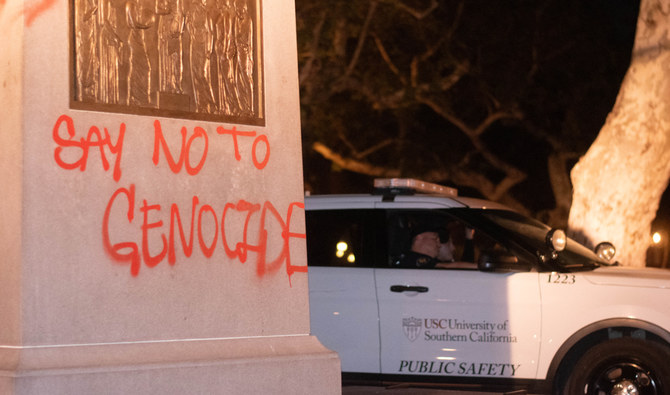
WASHINGTON: The White House insisted on Sunday that pro-Palestinian protests that have rocked US universities in recent weeks must remain peaceful, after police arrested around 275 people on four separate campuses over the weekend.
“We certainly respect the right of peaceful protests,” National Security Council spokesman John Kirby told ABC’s “This Week.”
But, he added: “We condemn the anti-Semitism language that we’ve heard of late and certainly condemn all the hate speech and the threats of violence out there.”
The demonstrations began at Columbia University in New York, but they have since spread rapidly across the country.
While peace has prevailed on many campuses, the number of protesters detained — at times by police in riot gear using chemical irritants and tasers — is rising fast.
They include 100 at Northeastern University in Boston, 80 at Washington University in St. Louis, 72 at Arizona State University, and 23 at Indiana University.
Among those arrested at Washington University was Green Party presidential candidate Jill Stein, who faulted police for aggressive tactics she said provoked the sort of trouble they are meant to quell.
“This is about freedom of speech ... on a very critical issue,” she told CNN shortly before her arrest on Saturday.
“And there they are, sending in the police and creating a riot.”
College administrators have struggled to find the best response, caught between the need to respect free-speech rights and the imperative of containing inflammatory and sometimes violently anti-Semitic calls by protesters.
At the University o Southern California, school officials late on Saturday closed the main campus to the public after pro-Palestinian groups again set up an encampment that had been cleared earlier, the school announced on X.
With final exams coming in the next few weeks, some campuses — including the Humboldt campus of California State Polytechnic University, have closed and instructed students to complete their classes online.
The activists behind the campus protests — not all of them students — are calling for a ceasefire in Israel’s war with Hamas and want colleges to sever ties with Israel.
Ukraine warns front ‘worsened’ as Russia claims fresh gains
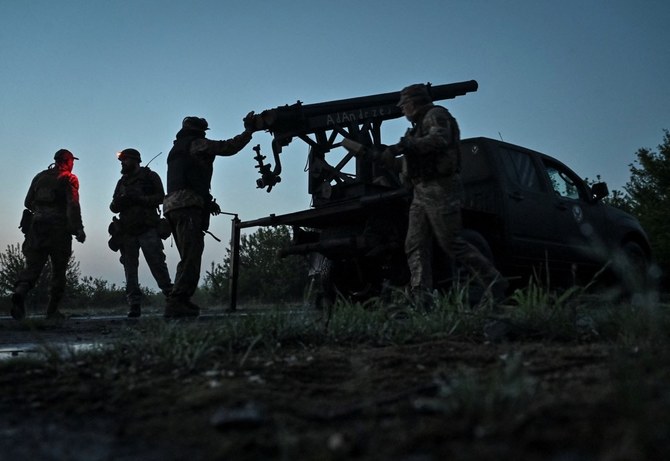
- Russia’s troops are advancing in the eastern Donetsk region
- The US finally approved a $61 billion package of financial aid
VOZDVYZHENKA, Ukraine, April 28, 2024 Agence France Presse: Ukraine’s army leader admitted Sunday that Kyiv’s position on the battlefield has worsened after Russian forces captured another village in the east, pressing their advantage in manpower and ammunition.
Russia’s troops are advancing in the eastern Donetsk region as Kyiv awaits the arrival of much-needed US weapons that it hopes will stabilize the fragile front lines.
“The situation at the front has worsened,” Ukrainian commander-in-chief Oleksandr Syrsky said in a Facebook post Sunday.
Ukrainian troops had “retreated” westwards to new defensive lines in a section of the front that runs past the city of Donetsk, controlled by pro-Russian forces since 2014.
Russia has “a significant advantage in forces and means” and had been able to notch up advances amid “heavy fighting,” Syrsky said.
“In some sectors the enemy had tactical success, and in some areas our troops managed to improve the tactical position,” he added.
Russia’s defense ministry earlier on Sunday claimed its troops had captured the village of Novobakhmutivka in the Donetsk region — around 10 kilometers (six miles) north of Avdiivka, which they seized in February.
The stark assessment of the picture facing Ukrainian troops comes at the end of week of ups and downs for Kyiv.
The United States finally approved a $61 billion package of financial aid after months of political wrangling, unlocking much-needed arms for Ukraine’s stretched troops.
But on the battlefield Russia chalked up more successes.
Its troops managed to make rapid advances in a narrow column to the northwest of Avdiivka.
In the village of Vozdvyzhenka, some eight kilometers from the fighting in Ocheretyne, AFP reporters saw civilians loading a small truck with furniture and belongings on Sunday.
“We’re going a long way from here... I don’t have time to talk because of the shelling,” one of them told AFP, before climbing into the vehicle and speeding out of the village.
Soldiers on the side of a road in the woods said they had originally been sent to build defensive lines.
“But the situation has changed. We were told not to take the shovels but to stay and wait for orders. The Russians are attacking and advancing,” one told AFP, speaking on condition of anonymity.
Syrsky confirmed on Sunday that Russia had made some “tactical” progress in that part of the front, but said Moscow had not yet achieved what he called an “operational advantage.”
He also said additional units were being deployed to replace those that had sustained heavy losses.
The recent setbacks have prompted rare criticism from Ukraine’s military bloggers.
“The (Russian) breakthrough near Ocheretyne revealed a number of problems,” the Deep State Telegram channel, with close links to the Ukrainian army, said in a post on Wednesday.
It said leaders of the 115th mechanized brigade, which is fighting in the area, were “responsible for the collapse of the defense in the entire sector, allowing significant losses.”
Kyiv’s forces are outnumbered across the battlefield, with the country struggling to recruit enough soldiers to replace those who have been killed, wounded or exhausted by the war, now in its third year.
Leaders in Kyiv have warned the military outlook could worsen in the next few weeks, while shipments of US weapons are making their way to the front lines.
“We are still waiting for the supplies promised to Ukraine,” said President Volodymyr Zelensky in his evening address Sunday.
Speaking after talks with Hakeem Jeffries, leader of the Democrats in the US House of Representatives, he said he had once again stressed the urgent need for Patriot anti-missile systems “as soon as possible.”
Ukraine’s head of intelligence at the ministry of defense Kyrylo Budanov said this month that the battlefield situation would likely be at its most difficult in mid-May to early June.




